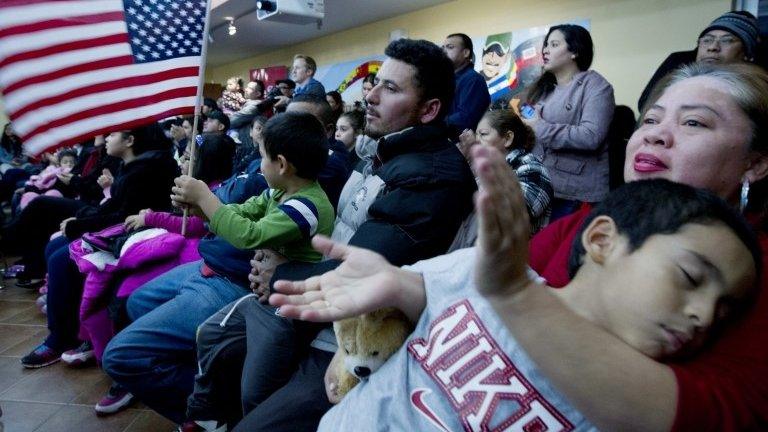How did immigration debate get so toxic?
- Published
- comments
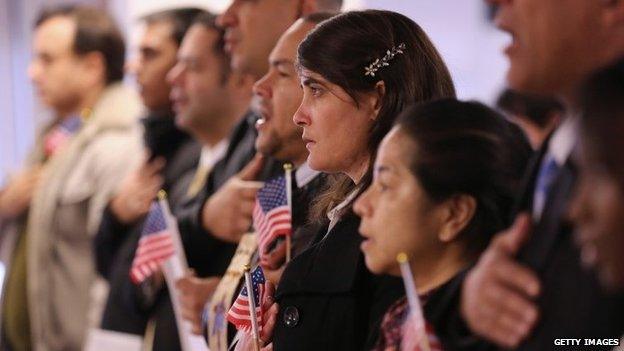
Much of the disagreement is over who gets to become an American
So before we get stuck into the meat of Barack Obama's announcement, let's play the quotation game.
Who said the following?
"Immigration policy should be generous; it should be fair; it should be flexible. With such a policy we can turn to the world, and to our own past, with clean hands and a clear conscience."
And who said this?
"We are a nation of immigrants. We are the children and grandchildren and great-grandchildren of the ones who wanted a better life, the driven ones, the ones who woke up at night hearing that voice telling them that life in that place called America could be better."
Five points if you got the first one - it was from John F Kennedy's book A Nation of Immigrants.

And the second quote was from? I'm sorry I'm going to have to hurry you. Okay, it was from Mitt Romney, whom Barack Obama beat to be re-elected to the presidency in 2012.
Here's the thing. The striking thing about quotes from US politicians when it comes to immigration is how alike the thinking has been, irrespective of whether or not the politician is Republican or Democrat.
All of which raises the question - how has the immigration debate in the United States become so polarised, so toxic, so unpleasant?
That it has cannot be doubted. Barack Obama says he has grown so weary of trying to get Congress to engage seriously that he is going it alone.
He's bypassing the legislature and brandishing his big stick - the executive order. It is governance by diktat. And the reaction of his opponents suggests it will spark an atmosphere of retaliation and revenge.
So let's break this down into three parts. One - the policy. Two - the constitution. Three - the politics
The starting point for the president is that America's immigration policy is broken. He says that again and again.
It's estimated there are some 11-12 million illegal immigrants in the US, half of whom are thought to be from Mexico, most of the rest from Central and South America.
But there are all sorts of anomalies.
Today I met Davide Duarte Valencia and his son Brian. Brian is legal because he has been at school here for more than five years, and is the beneficiary of an earlier reform not to expel kids enrolled in school.
But no such latitude exists for his father. He was pulled over a year ago by a traffic cop - and once it was found that he had no legal standing to live in the US - he was made to wear an electronic tag ankle bracelet.
This is to stop him absconding while awaiting deportation, and going back into the shadows.
"It's estimated that around 11 million people are here illegally", reports Jon Sopel
But deportation is slow. Even though the US is deporting some 300,000 people a year, it would take 30 years to clear the backlog.
So what Barack Obama has announced tonight is a mechanism where people like Davide will be able to stay and work and pay taxes and help grow the US economy.
Interestingly, public opinion suggests that those most opposed to immigration reform are people who live in states with the lowest concentrations of Hispanic residents.
Among this group there is still a perception that thousands of Mexicans are queuing at the border to cross the Rio Grande on a daily basis.
If anything, it is the reverse. With the Mexican economy growing impressively and becoming ever more powerful, so many Mexicans are going back home.
There was a crisis at the border in the summer, but that was caused by people coming from further south.
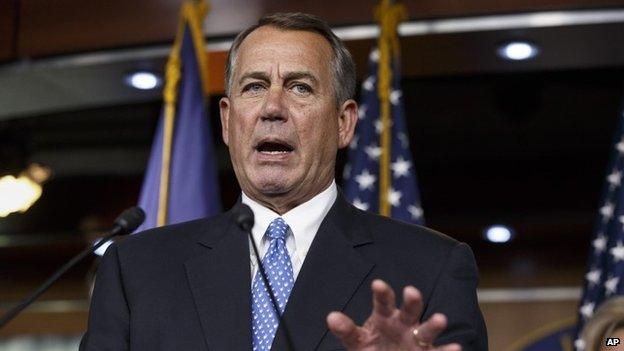
Republicans may say Mr Obama will regret taking action without Congress - but how far can they retaliate?
So if that is the policy issue, what about the constitutional? Is the president over-reaching himself, even acting illegally in using executive authority to change the way the immigration system works?
It's obviously not the conventional route. Law is made by votes in the legislature. And from January when the new Congress is sworn in, who will be in political control? Well it won't be the Democratic Party.
It's a pretty dusty, dry old debate. Mr Obama will cite prosecutorial discretion on his side. Republicans say this is rewriting laws which is beyond his authority.
The White House will likely counter his proposals are based explicitly on the law as it is written.
This could end up with the president being sued - there are mechanisms by which Congress could seek to overthrow his proposals but he has a veto.
Congress could go back to the issue again, but to defeat the president the Republicans would require a two-thirds majority in both Houses. Unlikely.
Which brings us finally to the politics.
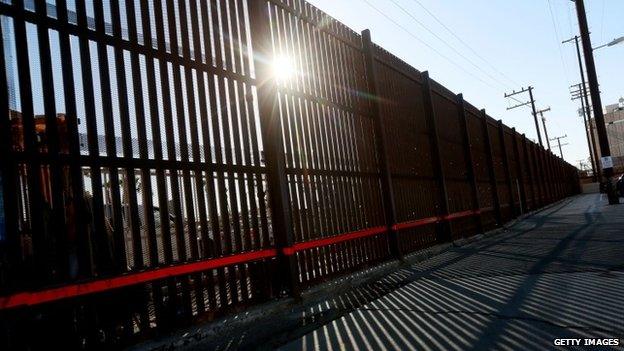
The political parties have fought over what tighter border security should look like
The Republicans believe that the Mr Obama's motives in pursuing immigration reform are far from benign. They have seen their support from Hispanic groups plummet in the last few presidential elections.
So what better way for the Democratic party to lock in that support than by granting millions of Hispanic immigrants the right to stay - and who knows, at some point in the future to give them a pathway to citizenship.
And oh yes, the right to vote.
A number of senior Republicans say this move by the president is all about 2016, and how to win after the dismal mid-term results.
When I wrote two weeks ago after the mid-term elections, the talk was of working together, and putting aside narrow differences.
Oh well, that didn't last long.
The spirit of that wonderful poem on the Statue of Liberty seems from a different age:
"Give me your tired, your poor,
Your huddled masses yearning to breathe free,
The wretched refuse of your teeming shore.
Send these, the homeless, tempest-tossed to me,
I lift my lamp beside the golden door!"
- Published20 November 2014
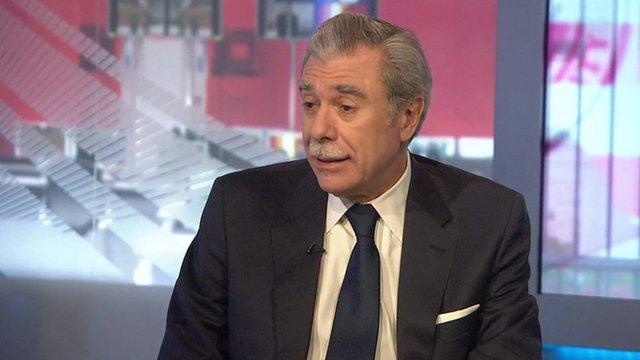
- Published21 November 2014
